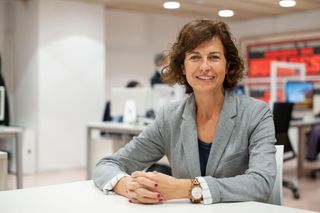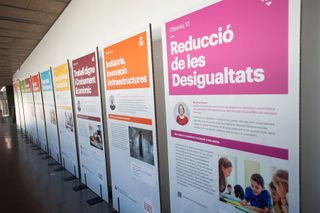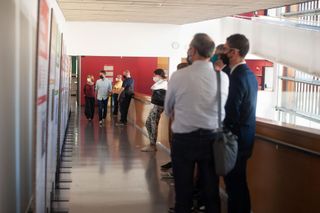- The weight of the Sustainable Development Goals of the 2030 Agenda in all fields of the university community involves a strategic and multidisciplinary plan to raise awareness and work on their development
- The University of Vic - Central University of Catalonia is a member of the Inter-University Council of Catalonia’s (CIC). CIC assesses the contribution of the catalan universities to the Agenda and also proposes a strategy for the catalan university system as a whole
The United Nations General Assembly on 25 September 2015 approved the 2030 Agenda for Sustainable Development with a system of seventeen goals (SDGs) to address the main global challenges of the future, from the fight against poverty or change climate to education, health, gender equality, peace and sustainable cities. In accordance with its commitment to society and the environment, the University of Vic - Central University of Catalonia promotes activities and initiatives in the framework of the 2030 Agenda in research, teaching and the university community and in all areas of knowledge that are specific to it.
Anna Sabata Aliberch, General Secretary of UVic-UCC, coordinates actions to publicize the deployment of the SDGs at UVic-UCC and the related initiatives that are being promoted. One of the initiatives is the traveling exhibition “Afrontant reptes globals”, which displays in a cross-disciplinary way some UVic-UCC projects that are directly related to the SDGs.
«The SDGs are a global proposal, but we must be clear that we will only achieve them as a society if every one of us keeps them in mind on a daily basis»
When we talk about the Sustainable Development Goals, they often seem very far from our lives, but they are present in all aspects of our daily activities. How do they affect the university context?
The SDGs are a global proposal, but we must be clear that we will only achieve them as a society if every one of us keeps them in mind on a daily basis. The university contributes in many, cross-disciplinary ways. In the teaching area, it instills in students the importance of the SDGs; in the field of research and knowledge transfer, it carries out projects that help to improve society in areas directly related to one or more of the goals; and at community level, it makes contributions to improve the efficiency of facilities, cooperation projects aimed at students and initiatives to improve health and sports practice, to give just a few examples.

In the UVic-UCC, what importance is given to the SDGs and how does the institution propose to work towards their achievement?
The UVIC-UCC considers that the SDGs are one of the university’s core concepts. As a university, we are committed to improving society in all areas and, above all, in those that are related to our work. In fact, the UVic-UCC Infrastructure and General Services Unit works to achieve a sustainable university based on two key factors: a commitment to renewable energies with the installation of photovoltaic panels; and optimization of energy and water consumption. From this basis, many factors of varying dimensions are designed to make the UVic-UCC a sustainable institution. They include the provision of electric cars for corporate mobility through an agreement with the cooperative Som Mobilitat and a waste strategy and prevention plan.
In the Office of the General Secretary, one of the objectives we have established is to make the SDGs known to students and the university community, to help spread information about existing initiatives and encourage active participation in these proposals and in the creation of new ones. This aim led to the traveling exhibition that was opened last year to explain what we were doing at UVIC-UCC in terms of SDGs, as well as some meetings on this topic.
How have the SDGs been introduced in teaching?
Several degree subjects work on the SGDs directly through their contents. For example, in the degree in Automotive Engineering, some key elements of the curriculum are the electric vehicle as the future of the sector and aspects of sustainable mobility; in the case of the degree in Multimedia: Applications and Video Games, a great effort has been made to find female role models, as this is a very male-dominated sector. These are just two examples, but all the degrees are working in this direction. However, it is more difficult to introduce SDGs in some than in others.
In addition, this year we have incorporated information in the Student Guide about the link between each subject and the SDGs. Last year, in the reports on each degree, we introduced a specific competence on gender equality and equality between people. Similarly, to encourage active participation and help raise awareness, when students propose their final year project or master’s thesis, they must explain which SDG(s) are linked to it.
«We will only achieve them as a society if every one of us keeps them in mind on a daily basis»
And in research?
Following the same criteria as in teaching, doctoral theses, national and international projects, and scientific publications must be linked to the SDG that is most closely related to them. In the case of the university’s internal research calls, points are given for research objectives that are associated with a SDG. Therefore, the final score reflects the projects that establish a real link with the goals.

When we talk about today’s university students, we often see them as a generation that is very aware of the climate emergency. Is this right?
I think concern for the environment continues to grow in the younger generations, who understand that there is only one planet and that the impact of climate change means we are endangering it. What we need is for the other generations to get onboard, because this is a problem that affects everyone.
«Participation can be with small actions that help us create a better university and, by extension, a better world»
How can UVic-UCC students participate in achieving the SDGs and take an active role in them?
Participation does not have to be on a large scale. You can participate with small actions that help us create a better university and, by extension, a better world. We talk about collaborating in national and international cooperation and volunteering projects; helping to make the university more inclusive; collaborating to achieve gender equality and zero tolerance for aggression of any nature; participating in sports activities to improve personal and collective well-being; joining solidarity breakfasts and recycling workshops, etc. The range of options within UVic-UCC is huge.
In the Catalan Government’s deployment of the 2030 Agenda, what role should the Catalan University System play?
In February 2019, the Inter-University Council of Catalonia’s (CIC) 2030 Agenda Group was founded. The aim of this working group is to assess the contribution of Catalan universities to the Agenda and to propose a strategy for the Catalan university system as a whole. Within this working group, four subgroups have been created: communication, plan monitoring mechanisms, development cooperation and healthy and sustainable universities. UVic-UCC is represented in each of these subgroups to be able to focus on joint work with other universities.
«We want to get the entire community into the culture of the SDGs, to keep it in mind in their daily lives and to consider what actions they can do to improve the society in which we live»

Looking ahead five years, what challenges has UVic-UCC set for SDGs?
UVic-UCC participates in one way or another in the seventeen SDGs, but as an institution we have chosen to focus on five: those for which we would like to be socially recognized in a few years that we have posed as a challenge. These are: SDG 3 Health and well-being, which we promote with related research projects and by fostering the health and well-being of people who are part of the community; SDG 4 Quality education, to ensure inclusive, quality education, promote learning opportunities for all and develop digital transformation projects; SDG 5 Gender equality, through which we want to achieve a university without gender inequality; SDG 7 Clean and affordable energy, working from the areas of research and knowledge transfer and from a more technical approach to create non-polluting energy infrastructures and technology; and, finally, SDG 11 Sustainable cities and communities, with a focus on the Vic campus, where work is being done to expand the Campus City model, which contributes to a healthy and sustainable urban environment. Beyond these challenges, we have a cross-disciplinary one: to get the entire community into the culture of the SDGs, to keep it in mind in their daily lives and to consider what individual or collective actions they can do to improve the society in which we live.
The exhibition “Facing global challenges”

The exhibition “Facing global challenges. The Sustainable Development Goals at the UVic-UCC” includes some of the most relevant aspects of the teaching, research and community activity that is carried out from within the UVic-UCC and that affects each of the seventeen SDGs in one way or another.
The exhibition is made up of an introductory panel and seventeen other panels, each of which is allocated to one of the SDGs from the perspective of the university. For each SDG, a member of the community has been selected from teachers, researchers, students and administrative and service staff, who with their testimony show the importance of that goal and the contribution made by the institution. Each panel also highlights a UVic-UCC project or initiative linked to the objective in question and lists others.
The exhibition is the result of months of work in which a large number of university centres and services have been involved, including faculties, schools, research groups and administrative and service areas. The exhibition officially opened on June 9 and could be visited for a few weeks in the Torre dels Frares building on the Vic campus. With the start of the new academic year, the exhibition has begun to move around to different buildings and campuses of the university to facilitate access to it and help raise awareness among the entire university community of the importance of knowing and actively participating in the SDGs.

ODS 3: Health and well-being
Anna Maria Puig-Ribera, coordinator of the research group in Sport and Physical Activity (GREAF)
“People's health is increasingly impacted by physical inactivity and sedentary lifestyles, which affect all of society, from children to elderly people. To combat this, it is vital to develop programmes for all society to take advantage of the benefits of regular physical activity from a physical, psychological, social and well-being perspective.”

ODS 4: Quality education
Núria Simó, researcher and director of the Centre for Studies and Research in Education
"Research in inclusive and democratic education is key to ensuring equal opportunities and social cohesion. It is also vital to foster educational knowledge to promote learning experiences that integrate the body, emotion and knowledge, and to strengthen links with the community for an education against inequalities. These are some of the main challenges facing the Centre for Studies and Research in Education.”

ODS 5: Gender equality
Anna Pérez Quintana, director of the Equality Unit
“Social justice involves achieving gender equality, which is worked on at UVic-UCC in various fields. In teaching and research, we incorporate the gender perspective, and with the second Equality Plan we aim to avoid sexism in labour relations and to address cases of sexual violence that may occur in the university environment.”

ODS 7: Clean and affordable energy
Joan Colón, scientific coordinator and researcher at the BETA Tech Center
"Waste from certain industries, livestock farms or facilities can be recovered in the form of by-products to generate new forms of energy. At CT BETA we work in this line of research with various projects that allow us to recover manure and sewage sludge. Thus, we can maximize the circularity of the processes and recover other value-added products such as micro and macronutrients (phosphorus, nitrogen).”

ODS 11: Sustainable cities and communities
Arnau Bardolet, Director of the UVic Infrastructure and General Services Unit
"Over the years, the university has grown in infrastructure and has been integrated into the city of Vic to become what we know today as a campus-city. This expansion has given rise to new forms of mobility. The mobility generated on the Vic campus could be defined as micromobility that we are working on to make it sustainable and safe.”